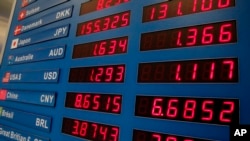Europe moved one step closer to a controversial bond-buying program Wednesday, following a legal ruling analysts say could be the "trigger" needed to stimulate the European economy.
The news comes as the World Bank cut its growth forecasts for 2015 and 2016, saying fears of prolonged stagnation in the euro area is one of the main reasons for the negative outlook.
A bond-buying program proposed by the European Central Bank is legal, according to top European Union lawyer General Cruz Villalon.
He says the ECB’s Outright Monetary Transactions program, known as OMT, would be compatible with European Union law.
Economics expert at the research group Chatham House in London, Iain Begg, says the decision is an important breakthrough for the single-currency union.
“Even something as technical and obscure as a European Court of Justice ruling may be the kind of trigger for a more optimistic outlook,” he said.
The Central Banks of the United States and Britain have bought government bonds in order to drive down interest rates, make credit more available, and kickstart the economy.
But the European Central Bank has been unable to do the same because its treaty explicitly prohibits the buying of government bonds.
OMT was announced in 2012 as a way to simulate the effects of quantitative easing in Europe. But it was never put into practice because of legal opposition from Germany, which has long pushed for Europe to fix its economic woes through austerity and structural adjustments, rather than by pumping money into the economy.
German opposition has led to a stalemate in Europe, says Begg.
“It is a question of who moves first: the French and Italians on addressing their supply-side difficulties or the Germans on relaxing their opposition to quantitative easing,” he added.
The news comes a day after the World Bank cut its global growth forecasts for 2015 and 2016. It said one of the main reasons the outlook has tilted downward is because of prolonged economic stagnation in the euro area, where the growth forecast is only 1.1 percent in 2015 and 1.6 percent in 2016-17.
Begg says with China’s economy appearing to be slowing down, oil producers suffering from very low oil prices and stagnation in Europe some fear the cumulative effect could trigger a global slowdown.
So, he says Wednesday’s legal decision will be treated as very good news by the markets, which would like to see the European Central Bank providing this stimulus to the European economy.
An expert on social and political theory at King’s College London, Alex Callinicos, says the impact on Europe’s political climate could also be valuable.
But he adds that if quantitative easing is implemented in the European Union, its impact on the economy will be a slow process, in contrast to the rapid “deterioration” currently taking place.
“The deterioration of the situation, both economically and politically, in Europe is not going particularly slowly. Particularly the political deterioration," he said. "The [political] center is under enormous pressure in Europe.”
He says the political landscapes in Greece, Spain, and France, in particular, are highly volatile at the moment, and Europe must take rapid action to stem the political tide.




